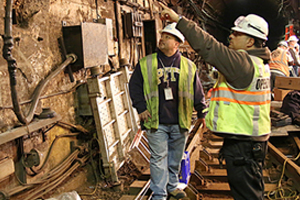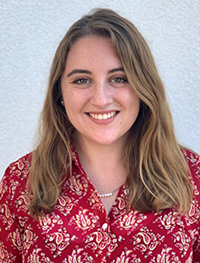APRIL 2023
Transportation and Climate
Opportunities and resources to support climate action at the local level
THE CHALLENGE
Transportation is major contributor to global warming emissions such as carbon dioxide and the leading source of greenhouse gas emissions (GHGs) in the U.S and in New Jersey. Within the transportation sector passenger vehicles that operate on gasoline or diesel are the largest emitters of GHGs. Reducing the use of single occupancy vehicles is critical to limiting warming and the negative impacts of climate change. While transportation emissions affect everyone, disadvantaged communities, including predominantly communities of color and low-income communities, bear the greatest consequences from the effects of climate change. Local government along with all other levels of government can take immediate steps to change how we get around by investing in sustainable transportation.
FEDERAL AND STATE PRIORITIES
The federal government and NJ have shared goals to decarbonize the transportation system which will in turn produce climate co-benefits such as improved air quality, community health, and safety, and reduced travel time, congestion, and noise pollution. The federal government is committed to a 50% reduction in US emissions by 2030, and a net-zero economy by 2050, and is working to ensure that at least 40% of climate investment benefits go to disadvantaged communities. NJ’s plans are closely aligned as the state seeks to reduce emissions by 50% from 2006 by 2030 and 80% from 2006 by 2050.

WHAT LOCAL GOVERMENTS CAN DO
Reducing emissions from transportation involves making travel more efficient, reducing the overall amount of vehicle travel, and deploying zero-emission vehicles and fuels for all passenger and freight travel modes. Local governments can take action on climate by ensuring existing infrastructure is in a state of good repair and making new investments in rail, transit, walking, biking, and shared mobility. Some other strategies include traffic signal optimization, intelligent transportation systems, and travel demand management. Start by prioritizing your community’s capital needs, developing a project pipeline, and coordinating with others as needed. Review available funding opportunities and then plan for which streams of funding to target.
1. MAKE IT EASIER TO WALK AND BIKE
Adopt a Complete Streets policy. Design connected routes for walkers and bicyclists within and between communities. Provide visible crosswalks, good lighting, designated bike lanes, curb bump outs, and countdown timers.
2. PROMOTE TRANSIT-FRIENDLY LAND USE AND TOD
Design and zone for compact development. Revitalize and redevelop areas around transit facilities into mixed-use neighborhoods. Invest in sidewalks, bike lanes, and shuttles to reach transit stations.
3. ENCOURAGE A SWITCH TO ELECTRIC VEHICLES (EV)
Prepare a municipal inventory and then replace suitable fleet with EVs.
4. EXPAND THE AVAILABILITY OF EV CHARGING INFRASTRUCTURE
Identify and invest in locations with demand for public charging stations.
5. MAKE TAKING TRANSIT MORE ATTRACTIVE AND CONVENIENT
Invest in bus shelters, signage, lighting, sidewalks, bike paths, and bike storage.
6. EXPAND THE AVAILABILITY OF SHARED MOBILITY OPTIONS
Invest in shuttle services and shared e-bikes/e-scooter systems. Provide incentives for shared rides.
7. BE CREATIVE
The above are example strategies can reduce emissions though anything local government can do to reduce dependency on gas- or diesel-fueled vehicles is climate action.
FUNDING OPPORTUNITIES
The Infrastructure Investment and Jobs Act (IIJA), or the Bipartisan Infrastructure Law (BIL), and the Inflation Reduction Act (IRA) were enacted in 2021 and 2022. The IIJA provides $1.2T for roads, bridges, rail, transit, ports, airports, water systems, and broadband. The IRA channels $147.81B toward climate, energy, and health. The most significant spending under the IIJA is in reauthorized formula funding programs, such as the Surface Transportation Block Grant Program. These programs provide substantial flexibility to address local transportation needs best and provide opportunities to fund low-carbon strategies.
FUNDING MATRIX
Identify climate-smart transportation investment opportunities for your community here.
More Climate Briefs
Transportation and Climate

Ocean Acidification
How to Adapt to Climate Change
The National Flood Insurance Program and New Jersey
Climate-Smart Gardening
How to Reduce Your Greenhouse Gas Emissions
Farming, Food, and Climate Change in New Jersey

Climate Change, Health, and Equity in New Jersey
Sea Level Rise in New Jersey: Projections and Impacts





 Angel Alguera
Angel Alguera Daniel Gilkeson
Daniel Gilkeson Benjamin Goldberg
Benjamin Goldberg Surya Jacob
Surya Jacob Vineesh Das Kodakkandathil
Vineesh Das Kodakkandathil Douglas Leung
Douglas Leung Nihar Mhatre
Nihar Mhatre Justin Morris
Justin Morris Josephine O’Grady
Josephine O’Grady Jessica Parineet
Jessica Parineet Dillan Patel
Dillan Patel Moira Sweeder
Moira Sweeder